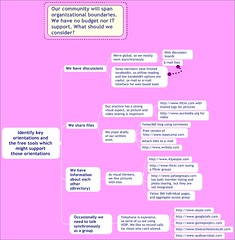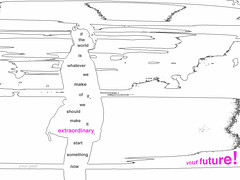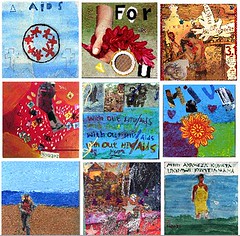Africa News 2005 Quiz - How Africa Savvy Are You?
Teaching About Social Software With Social Software
Blogger Blog This - Changed and Not Working for Me
The Northern Voice 2006 Schedule is Out
2006 Wishes: what you'd like to see more/less of in the blogosphere
I'm Still on Holiday Blogging Break
del.icio.us/for/choconancy - Never Saw This Before
Technology For Communities - How I'm Tracking My Resources
Thinking about choosing tools for communities of practice
Unconferences, Mucking About and Commenting Habits
Great Gmail Hack: Sorting your email with GMail
A Gift You Can Give - Your Time and Talent
A commercial worth sharing
New York Times Interactive Graphic Guide to the Transit Strike
My Favorite Squidoo Lens So Far: Visual thinking school
Free Digibook on Online Instruction
Potluck as metaphor (and reality) of civic engagement
Web 2.0 and Communities of Practice: What gives?
Synaptic Leap - Online Communities for Science
Discardia and the Winter Solstice
TechSoup - Human Rights and Web 2.0
Evelyn Lands: Tsunami Anniversary: Landed in Bangkok
Rip, Mix, Learn - Another one by Darren Kuropatwa
Tango as a Learning Metaphor
Community Indicators - Asking for Help
First Monday December 2005 - It's Out and Interesting
You Gotta Love Food Bloggers: A Menu for Hope II
Great Comment on Shelly's Blog
What of the Online World if we Have a Flu Pandemic
Updated multiple word Technorati tag creator for Blogger
Tuesday Fun: Web 2.0 Validator : We're the dot in Web 2.0
Archive your Yahoo Group Messages
J. LeRoy: Stockphoto Racing
Kiva - Investing In Human Lives
Dear Squidfolk - My Experiences with Squidoo so Far
Crash Course on Blogging for Non Profits - December 19th
Information & Communication Systems (ICS) in Disaster Response and Management
Mena's Excellent Question - Productive Conversations Online?
Please be nice - our expectations on back channel
Yahoo buys del.icio.us - Think about the thread that ties things together....
Living Life Online: Online End of Class Party
Holiday Resource: Nancy's Fudge Recipe
extraordinary [what's next....]
Context: Mena's Speach Transcript from LesBlogs
Blog Civility? Collecting Thoughts for a SXSW Panel
Flickr: Photos from eye:hand
Some thoughts on back channel and intermediated conferences from Raymond M. Kristiansen
When Blogging Becomes a Communal Act
Rosie blogs and now has a store attached
A pediatric digital storytelling system
Squidoo Goes Live - Lenses, Experts and Human Touch
Geeky Holiday Gifts - Threadless T-Shirts (plus a community angle)
Welcome to (CoP) Blogging, Dorine
Blogs, Responsiveness and What the Web Can Do
Yahoo 360, Yahoo Groups and Managing Multi Membership
A short reflection on what it means to "help"
WikiMatrix / Wiki Feature Comparison
Bibliography on Gender and Technology in Education
Community Indicators - Welcome Pages
December 1 - World AIDS Day 2005
















